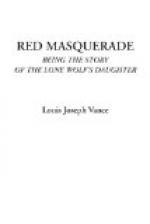For herself she was unafraid, she foretasted entire success. How should it be otherwise? Consider how famously chance had prospered her designs, playing into her hands the information that this Monsieur Lanyard was not at home, might not return till very late, and was expecting a call from somebody whom he desired to await his return in his rooms!
With such an open occasion, how could one fail?
Sofia asked only three minutes alone with the painting....
And if by any mishap she were caught, still she would not be dismayed. The letters were hers, were they not? They had been stolen from her, he had no right title to them who had purchased only the picture which had served as their hiding-place. By all means, let him keep that stupid canvas; he could hardly refuse to let her have her letters, not if she pleaded her prettiest. And even if he should prove obtuse, ungenerous....
Her smile was definite and confident. She was beautiful—and Monsieur Lanyard was aware of that. Had she not, that afternoon, in the auction room, without his knowledge detected admiration in his eyes, a look warm with something more than admiration only?
He was impressionable, then. And it would be no distasteful task to play upon his susceptibilities. He was not only personally attractive ("magnetic” was the catch-word of the period), but if half that Lady Diantha had hinted concerning him were true, to make a conquest of Michael Lanyard would be a feather in the cap of any woman, to attempt it a temptation all but irresistible to one—like Sofia—in whose veins ran the ichor of progenitors to whom the scent of danger had been as breath of life itself. It was hardly conceivable; even now Sofia must smile at her friend’s amiable endeavours to identify this mysterious monsieur with a celebrated and preposterous criminal.
It might be true that, as Lady Diantha had declared, wherever Michael Lanyard showed himself in open pursuit of his avowed avocation as a collector of rare works of art—in London, Paris, Berlin, Vienna, or where-not—there in due sequence the Lone Wolf would consummate one of his fantastic coups.
And it was indisputable that Lanyard was at present living in London, where for some time past the Lone Wolf had been perniciously busy; or else his bad name had been taken in vain by a baffled and exasperated Scotland Yard.
Again: Diantha had insisted that the Lone Wolf was by every evidence completely woman-proof; and there might be something in her contention that such an elusive yet spectacularly successful thief could hardly have won the high place he held in the annals of criminology and in the esteem of the sensation-loving public, if he were one who maintained normal relations with his kind.
Sooner or later (so ran Diantha’s borrowed reasoning) the criminal who has close friends, a wife, a mistress, children, family ties of any sort, or even body-servants, must willy-nilly repose confidence in one of these, and then inevitably will be betrayed. Depend upon envy, jealousy, spite, or plain venal disloyalty, if accident or inadvertence fail, to lay the law-breaker by the heels.




